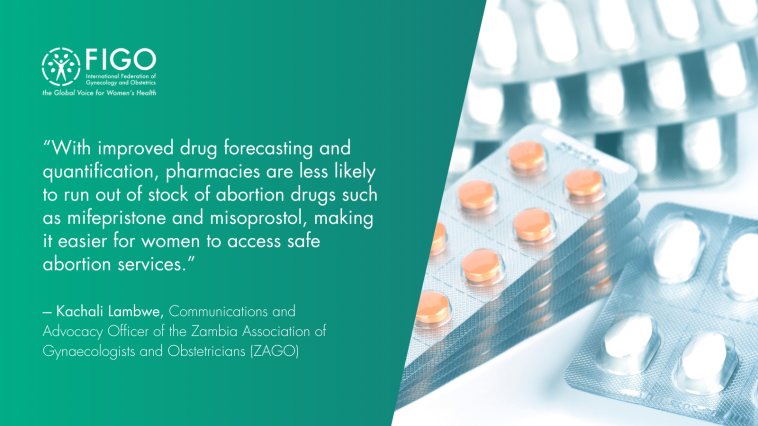Training for pharmacists and supply chain managers improves access to medical abortion drugs in Zambia

Kachali Lambwe, Communications and Advocacy Officer of the Zambia Association of Gynaecologists and Obstetricians (ZAGO), tells us how training pharmacists and supply chain managers on drug forecasting and quantification helped mitigate shortages of medical abortion (MA) drugs, ensuring availability of essential medications for patients.
What are the main factors restricting access to safe abortion services in Zambia?
The two main barriers are the lack of abortion drugs and the costs of safe abortion services.
Women and girls who opt for medical abortion face challenges accessing the service, due to erratic supply of abortion medicines. This contributes to the cost of safe abortion services, which can be very expensive in Zambia. The unavailability of drugs in public health facilities means that women and girls are asked to buy high-priced drugs in private pharmacies. This makes the service inaccessible to many patients, pushing them to seek unsafe and potentially life-threatening abortion methods.
Why did ZAGO decide to deliver training for pharmacists and supply chain managers?
A survey of the healthcare facilities we worked with as part of the Self-Management of Abortion (SMA) Project indicated that 87% of them had no medical abortion drugs in stock.
Pharmacists and supply chain managers are key players in ensuring that patients have access to the medications they need, so improving their skills on drug forecasting and quantification is crucial to prevent drug shortages and disruptions in patient care.
We identified the need to deliver specialist training to help them anticipate demand for medical abortion drugs, optimise stock levels and proactively address any potential shortages. This ultimately improves availability and accessibility of medical abortion drugs for patients, guaranteeing continuity of care and preventing any negative impact on health outcomes.

How did the training help improve access to safe abortion care?
The training addressed the problem of women's access to safe abortion services head-on, by ensuring that pharmacies are well-stocked with MA drugs for abortion procedures.
With improved drug forecasting and quantification, pharmacies are less likely to run out of stock of abortion drugs such as mifepristone and misoprostol, making it easier for women to access safe abortion services. This ultimately helps reduce barriers such as long waiting periods or having to travel long distances to find a pharmacy with the necessary medications in stock.
Additionally, the training enabled pharmacists to be better equipped to provide accurate information and guidance to women seeking abortion services. Pharmacists play a crucial role in helping women understand how to take the medications at home safely and effectively, as well as addressing any potential side effects or concerns they may have.
What was the unique role of ZAGO in this activity?
ZAGO’s unique role was to coordinate the training with Ministry of Health and the Zambia Medicines and Medical Supplies Agency (ZAMMSA). Through coordinating, ZAGO was able to ensure that forecasting and quantification of essential medication and supplies for reproductive health services were tailored to the safe abortion needs of women and girls. This activity helped to impart knowledge on providers to improve the availability and accessibility MA drugs, ultimately contributing to better health outcomes for women and girls in the country. Financial logistics for the training was provided by ZAGO under the SMA project.
What are the key learnings from running this initiative?
Following the training, we identified the following next steps to ensure continued progress:
- Having acquired knowledge and skills from the training, ZAMMSA committed to start honouring and fulfilling orders of MA drugs by facilities.
- To avert inventory shortages, facilities should start ordering commodities themselves, as opposed to using third parties.
- Comprehensive Abortion Care (CAC) providers should work together with pharmacy staff to enhance coordination and optimise drug supply management.
- The government should invest in software and tools to automate and streamline the drug forecasting and quantification process.
- Participants emphasised the need for continuous professional development of pharmacists and supply chain managers to keep up with the latest trends and best practices in drug supply management. Therefore, training and orientation of pharmacy staff must be prioritised.
- ZAGO has written to Ministry of Health requesting ZAMMSA to include the society into the system as a client in drug procurement and distribution to health facilities. This will enable ZAGO to order MA drugs on behalf of the health facilities in the country.
- Sharing knowledge and experiences with other pharmacists and CAC providers is crucial to promote best practices in drug supply management, and ZAGO will continue to promote the initiative.
What do you see as the long lasting impact of the training?
We anticipate the long-term benefits of the training to include:
- Improved patient outcomes: by accurately forecasting and quantifying drug needs, pharmacists will help ensure patients receive the right care at the right time. This will prevent patients to be forced to purchase drugs in expensive private pharmacies. Therefore, ZAGO expects to improve patient adherence to their treatment regimen, ultimately leading to better health outcomes.
- Cost savings: effectively predicting demand for medications avoids both understocking and overstocking, and helps reduce waste and save on inventory costs. Healthcare facilities will be able to operate more efficiently, potentially lowering healthcare costs for patients.
- Enhanced patient care: pharmacists will be able to provide personalised quality care to their patients, anticipating their medication needs and addressing any potential supply chain issues.
- Better medication management: Healthcare facilities are expected to streamline their inventory management processes, monitoring stock levels of MA drugs to prevent shortages.
This training was delivered as part of FIGO’s Self-Managed Medical Abortion care project – please see here to learn more.